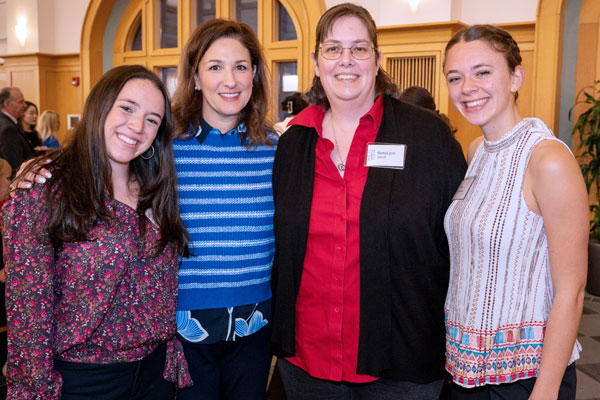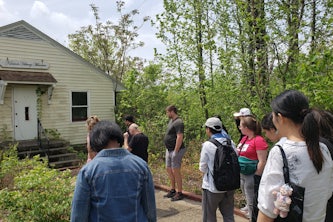Coach, adviser and friend: A conversation with women mentor pair
Alumnae Cheryl Perlmutter and Abigail Jaeger share their experiences with the Women & Engineering Center’s mentorship program

Cheryl Perlmutter and Abigail Jaeger share a great deal in common: Both are mechanical engineers, both were raised Jewish and both are the first engineers in their families.
They’re also both alumnae of the McKelvey School of Engineering at Washington University in St. Louis. Perlmutter, who earned a bachelor’s degree in mechanical engineering and a master’s degree in business administration from WashU in 2000 and 2005, respectively, and Jaeger, who earned a bachelor’s degree in mechanical engineering in 2023, were paired through the Women & Engineering mentorship program in early 2021 and have remained close since.
Perlmutter and Jaeger spoke about their experiences in the mentorship program and the benefits they received from their connection.
Why did you decide to get involved with the Women & Engineering Center’s mentorship program?
Jaeger: Before coming to WashU, I didn't have any strong mentors. I heard about this program during my freshman year and was especially interested in having someone I could look up to and could get advice from about career choices, what a job in the industry looks like and what my goals should be.
Perlmutter: I’ve been mentoring for about 15 years. I have a lot of empathy for what it’s like to transition to engineering school and then from school into the working world. You need someone there to explain that the expectations are going to be different. When you enter the working world, you are essentially starting a new learning journey. That can surprise students because often they expect to be able to hit the ground running and deliver work products immediately. They may not have been exposed to the organizational complexity of a company.
What is it like to be a woman in mechanical engineering, and how does mentoring help with that?
Perlmutter: When I was at WashU, women made up no more than 20% of mechanical engineering students. When I went to work for Boeing, I was the only woman engineer on a floor of hundreds and was one of the youngest engineers. I felt so awkward.
Jaeger: I feel extra pressure to prove myself. I felt that in school sometimes, but I worked hard and gained a lot of respect by putting in that extra effort.
Perlmutter: My first boss was phenomenal. He really believed in me and my potential. I had that bolstering but I don’t think a lot of people automatically get that. That’s where the mentoring program can help. Mentors can't fix every problem, but they can build up the mentee’s confidence so they can fix their own problems or ignore those things that aren’t serving them.
What are the traits or skills you need to have a successful mentoring relationship?
Jaeger: Open communication is very important. I'm fortunate that Cheryl is so easy to talk to. I felt comfortable sharing my struggles and knew she would give me the best advice. As the mentee, you should give yourself homework. I'll go to a session with Cheryl, but if I don't act upon what she tells me to do, then there's no point.
Perlmutter: Abby walked the walk here. It’s all about being proactive, organized and showing up with an agenda or questions that you want help with. A mentor can only respond to requests for help, and that’s hard when the mentee doesn’t lead the conversation.
What I need to do to be a good mentor is to be available and refrain from judgment. I'm never going to tell Abby she's on the wrong track, but I might ask questions to spark reflection. I can give advice, but it’s rooted in my experience, which may not work for everyone.
Abby, can you share a time when Cheryl’s mentorship helped you through a challenge?
Jaeger: During my first internship, I had no idea what to expect. My job was in thermocasting, and I had no knowledge of heat transfer. I also felt a bit forgotten as the intern. I called Cheryl, and she said, “Abby, you need to advocate for yourself.” I found that there were a lot of problems with how they onboard new employees, so I made a handbook of what people need to know when they first come to the company. That helped me to stand out, and they started giving me more responsibilities.
Cheryl, what benefit do you get out of mentoring?
Perlmutter: Helping Abby navigate obstacles and seeing her succeed is a wonderful feeling. At this point in my career, it means more to help someone than to be super focused on what my next move is. I love keeping in touch and seeing where my mentees go. I highly recommend becoming a mentor, but only if you’re willing to put the time aside. The feeling you get is incredibly rewarding. It’s also a great way to keep in touch with the university and what’s going on there.
Jaeger: I'm very fortunate to have had Cheryl help me. She inspires me to do the same, and I hope to mentor others at WashU and in the workplace.
Click on the topics below for more stories in those areas
- Undergraduate Students
- Alumni
- Women & Engineering
- Diversity
- Mechanical Engineering & Materials Science



